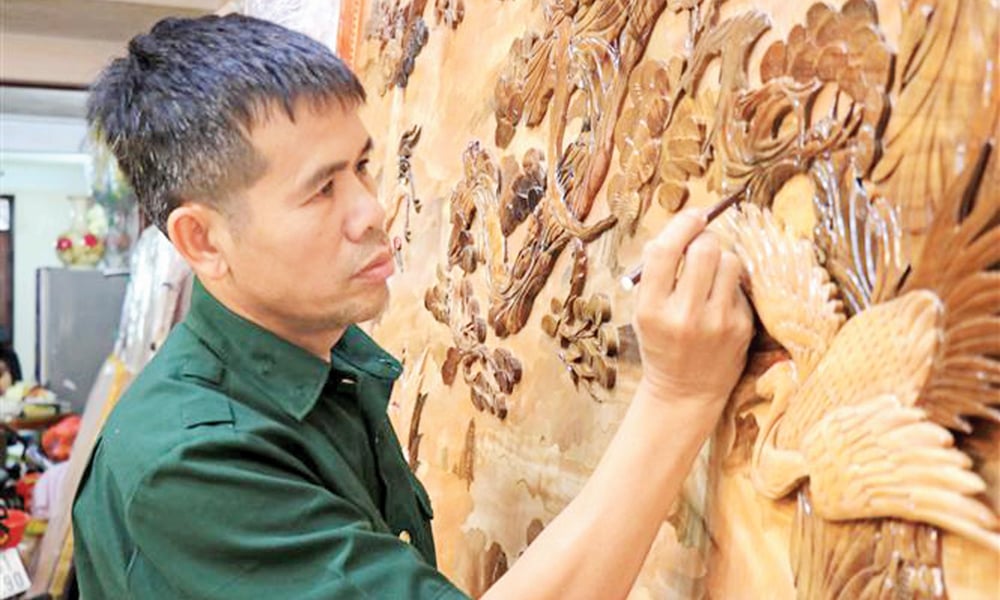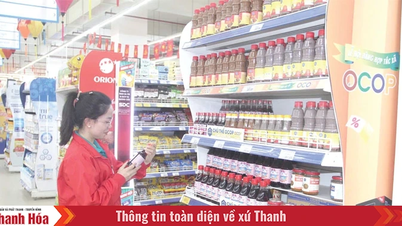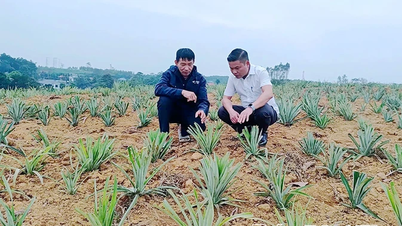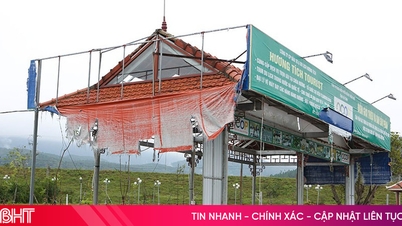Many products are due for recertification.
The national One Commune One Product (OCOP) program began to be implemented nationwide in 2018 under Decision No. 490/QD-TTg of the Prime Minister. After 7 years of implementing the program, Bac Ninh has successfully developed hundreds of typical products, contributing to the economic development of rural areas and increasing people's income. By the end of September 2025, the whole province had 773 OCOP products, including 1 5-star product, 114 4-star products and 658 3-star products.
Products of Hung Manh wood mosaic establishment are due for re-recognition of OCOP. |
According to the provisions of Decision No. 148/QD-TTg dated February 24, 2023 of the Prime Minister, the OCOP product certificate is valid for 36 months from the date of recognition. After that period, the subject must apply for re-recognition if they want to continue using the OCOP trademark on packaging when circulating on the market. According to the Department of Cooperative Economics and Rural Development (Department of Agriculture and Environment), in 2025, the whole province has 141 products with expired certification (30 4-star products and 111 3-star products). Of which, 42 products expire after January 4; 18 products expire after August 31; 23 products expire after September 8 and 58 products expire after December 27.
Every year, localities organize two rounds of evaluation and classification of OCOP products in July and October. However, since the beginning of the year, only a few localities have organized conferences, mainly for new products; no subjects have submitted dossiers requesting re-recognition. Based on this reality, on August 6, 2025, the Department of Agriculture and Environment issued a document requesting the People's Committees of communes and wards to notify and guide subjects to prepare dossiers for re-recognition according to regulations. The dossier includes an evaluation registration form, a review report of results after 3 years on raw materials, markets, quality, product declaration, etc. The Department will preside over and coordinate with relevant units to conduct on-site inspections on the development of OCOP products, maintain criteria and comply with current regulations of the Program (if necessary); carry out steps to evaluate and re-classify OCOP products according to regulations. The deadline for receiving dossiers for re-evaluating OCOP products proposed by the People's Committees of communes and wards and sent to the Department of Agriculture and Environment is before November 10, 2025.
Difficulties from the subject side
Reality at the facility shows that many entities are not interested in re-recognition. A typical example is the business household Nguyen Van Dong (Gia Binh commune) whose bronze drum face and five-color bronze worshiping set products have expired since January 2025 but have not yet submitted their application. The reason is that the traditional bronze casting craft village is facing difficulties in terms of production space and consumption market. The owner of the facility believes that the 3-year certification period for OCOP products is too short. When achieving OCOP, the household has implemented printing of labels and product packaging, which is costly, and has proposed extending it to 5 years to create conditions for stable production.
Similarly, the Da Mai Clean Agricultural Vermicelli and Cake Production Cooperative has 3 dry vermicelli products that are due for re-recognition but have not yet submitted their applications. Ms. Luong Thi Dien, representative of the cooperative, said that the unit has just invested in a new production line for fresh vermicelli, so it has not spent much time on preparing re-recognition applications for dry vermicelli products. Some other products such as dry pho, Que Hang Chau Son dry vermicelli (Ngoc Thien commune), BAKO white wine and apple wine (Dong Cuu commune), Nhu Bao leaf yeast wine, Son Dong commune... have also expired but the subject has not yet submitted their applications.
There are many reasons why some production facilities and cooperatives are not interested in re-certifying OCOP products. Currently, the province has a mechanism to support costs for entities whose products are OCOP certified for the first time, but there is no separate policy to support re-certification costs. This causes most household and cooperative owners to have to pay for consultants to design models and packaging, as well as conduct tests and complete documents as required. Most production households and cooperatives are small and medium-sized, have little investment capital, and unstable consumption markets. Some entities are also worried about "losing stars" or "falling in rank" when re-certifying, so they are not interested.
Motivating the subjects
In the face of the above situation, many opinions suggest that it is necessary to synchronously deploy solutions. First of all, departments, branches and localities must focus on supporting and advising on step-by-step completion of documents, reducing pressure on administrative procedures. In addition, the province should study a mechanism to partially support funding for inspection, certification, packaging design, intellectual property registration, etc.
After stabilizing the administrative units, communes and wards need to pay attention to including the content of supporting new recognition or re-recognition of OCOP products in the local key tasks associated with the trade promotion plan; bringing products to fairs, supermarkets, and e-commerce platforms. When the consumption market is favorable, the subjects will clearly see the benefits of maintaining OCOP certification. More importantly, it is necessary to propagate so that cooperatives and enterprises understand that re-recognition is not only an administrative procedure, but also a "passport" to help products enhance their reputation, affirm their quality and open up opportunities to access larger markets.
According to Mr. Luu Van Khai, Head of the Department of Economic Cooperation and Rural Development, the OCOP cycle is implemented according to the principle that the State plays the role of creating, guiding, managing, supervising, and supporting; production establishments, based on their capabilities and actual conditions, propose to participate according to their needs. Currently, the specialized agency has sent notices to entities with expired products, and at the same time assigned staff from specialized departments to regularly inform communes and wards with products due for recognition, instructing entities to complete procedures early and submit documents on time. The unit also coordinates to inspect and supervise compliance with regulations. Units that violate the regulations on using the OCOP trademark will be handled according to regulations.
Article and photos: Mai Toan
Source: https://baobacninhtv.vn/bac-ninh-ho-tro-cac-chu-the-ocop-tham-gia-danh-gia-cong-nhan-lai-postid427085.bbg






![[Photo] "Ship graveyard" on Xuan Dai Bay](https://vphoto.vietnam.vn/thumb/1200x675/vietnam/resource/IMAGE/2025/11/08/1762577162805_ndo_br_tb5-jpg.webp)

































![[Video] Hue Monuments reopen to welcome visitors](https://vphoto.vietnam.vn/thumb/402x226/vietnam/resource/IMAGE/2025/11/05/1762301089171_dung01-05-43-09still013-jpg.webp)












































































Comment (0)